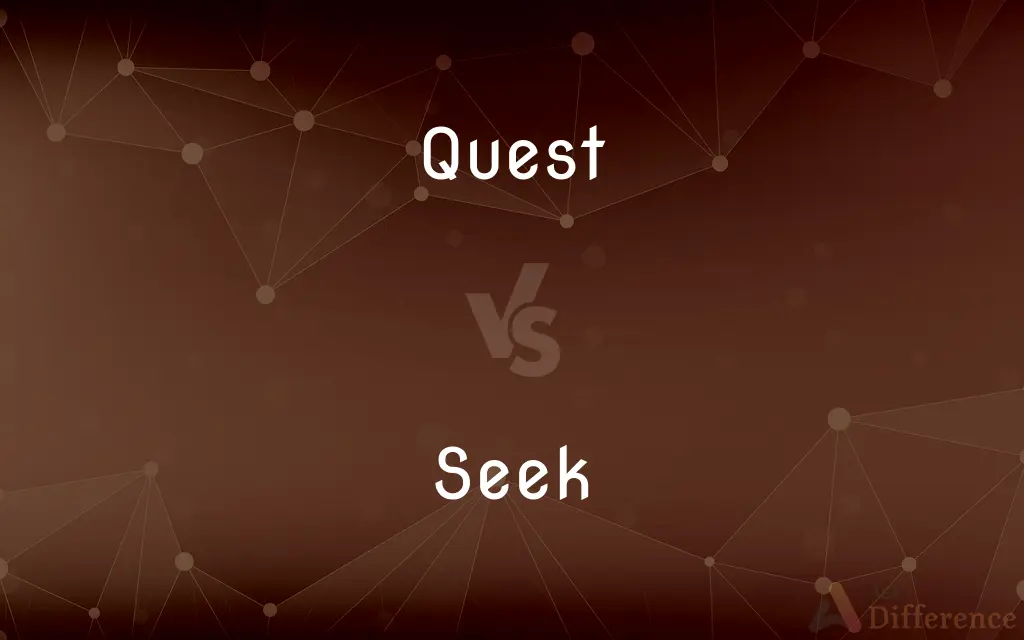Quest vs. Seek — What's the Difference?
Edited by Tayyaba Rehman — By Fiza Rafique — Updated on April 5, 2024
Quest implies a journey or search, often with a specific goal in mind, while seek involves the act of looking for or trying to find something.

Difference Between Quest and Seek
Table of Contents
ADVERTISEMENT
Key Differences
Quest typically denotes an adventurous or prolonged search, emphasizing a journey with a clear objective or end goal, often imbued with significance or purpose. It suggests a committed pursuit, possibly involving challenges or obstacles to overcome. On the other hand, seek tends to refer to the act of searching or trying to find something, without necessarily implying a journey or adventure. It focuses more on the act of looking for something rather than the narrative or journey that quest suggests.
While quest often carries connotations of a larger, more epic or narrative-driven pursuit, seek is generally used in a broader sense, applicable to a wide range of scenarios from the mundane to the profound. For example, one might seek information, seek to understand a concept, or seek a lost item, suggesting a more immediate or direct action. In contrast, a quest might involve a long-term endeavor, such as a quest for knowledge, where the journey itself, along with its trials and discoveries, is an integral part of the experience.
The context in which quest and seek are used also differs. Quest is frequently found in literature, mythology, and gaming, where it can denote a significant journey or mission, often with heroic or grand undertones. Seek, meanwhile, is more versatile, used across various contexts from everyday language to academic and professional settings, indicating a search or pursuit without the narrative depth or epic scope often associated with quests.
In terms of their motivational nuances, a quest usually implies a deeper level of commitment or dedication towards achieving a particular goal or finding something of great value. It suggests an undertaking that is significant to the individual or group involved. Conversely, seek might not always carry the same level of emotional or personal investment, often referring to a more general process of looking for or trying to obtain something without the connotation of a journey or significant personal transformation.
The choice between using quest and seek often depends on the desired emphasis and context. Quest is selected to convey a sense of adventure, challenge, or significant pursuit, often with a clear, meaningful objective. Seek, in contrast, is more commonly used for general searches or inquiries, emphasizing the process of searching itself rather than the narrative journey or the challenges faced along the way.
ADVERTISEMENT
Comparison Chart
Definition
A journey or search with a specific goal in mind
The act of looking for or trying to find something
Connotation
Adventure, significant pursuit
General search, immediate action
Usage Context
Literature, mythology, gaming
Everyday language, academic, professional settings
Motivational Nuance
Deep commitment, significant undertaking
General process of searching, without epic undertones
Focus
Narrative journey, challenges
Act of searching itself
Compare with Definitions
Quest
An adventurous or significant pursuit with a clear goal.
The knight's quest for the Holy Grail took him across many lands.
Seek
More immediate or direct action, without epic undertones.
I seek a practical solution to this everyday problem.
Quest
Commonly found in stories, games, and as metaphors in personal growth.
The novel's protagonist embarks on a quest to find the lost city.
Seek
Versatile, used in various settings from daily speech to professional discourse.
The company seeks innovative ideas from its employees.
Quest
Implies a journey with challenges to overcome.
Their quest for knowledge led them to study ancient texts and artifacts.
Seek
On the act of searching or inquiring.
Seek and you shall find is a commonly heard piece of advice.
Quest
Often carries epic or narrative significance.
Her quest to discover her ancestry revealed a family history full of intrigue.
Seek
To look for or try to find something.
He went to the library to seek information for his research paper.
Quest
On the journey and its significance.
The quest for personal fulfillment is a lifelong journey for many.
Seek
Can imply a broad range of pursuits, not necessarily tied to a journey.
They seek to improve community health through their nonprofit work.
Quest
A quest is a journey toward a specific mission or a goal. The word serves as a plot device in mythology and fiction: a difficult journey towards a goal, often symbolic or allegorical.
Seek
To try to locate or discover; search for
Animals seeking prey.
Quest
The act or an instance of seeking or pursuing something; a search.
Seek
To endeavor to obtain or reach
Seek a college education.
Quest
An expedition undertaken in medieval romance by a knight in order to perform a prescribed feat
The quest for the Holy Grail.
Seek
To go to or toward
Water seeks its own level.
Quest
An inquest.
Seek
To inquire for; request
Seek directions from a police officer.
Quest
A jury appointed to take part in an inquest.
Seek
To try; endeavor
Seek to do good.
Quest
To search for something
Quested for knowledge.
Seek
To make a search or investigation
Seek and you will find.
Quest
To go on a quest.
Seek
(ambitransitive) To try to find; to look for; to search for.
I seek wisdom.
Quest
To search for game or bay when sighting game, as a hound.
Seek
(transitive) To ask for; to solicit; to beseech.
I seek forgiveness through repentance.
Quest
A journey or effort in pursuit of a goal (often lengthy, ambitious, or fervent); a mission.
Seek
(transitive) To try to acquire or gain; to strive after; to aim at.
I sought my fortune on the goldfields.
Quest
The act of seeking, or looking after anything; attempt to find or obtain; search; pursuit.
To rove in quest of game, of a lost child, of property, etc.
Seek
To go, move, travel (in a given direction).
Quest
(obsolete) Request; desire; solicitation.
Seek
(transitive) To try to reach or come to; to go to; to resort to.
When the alarm went off I sought the exit in a panic.
Quest
(obsolete) A group of people making search or inquiry.
Seek
To attempt, endeavour, try
Our company does not seek to limit its employees from using the internet or engaging in social networking.
Quest
(obsolete) Inquest; jury of inquest.
Seek
To navigate through a stream.
Quest
(education) A short test.
Seek
(computing) The operation of navigating through a stream.
Quest
(intransitive) To seek or pursue a goal; to undertake a mission or job.
Seek
Sick.
Quest
(transitive) To search for something; to seek.
Seek
To go in search of; to look for; to search for; to try to find.
The man saked him, saying, What seekest thou? And he said, I seek my brethren.
Quest
To locate and attach to a host animal.
Seek
To inquire for; to ask for; to solicit; to beseech.
Others, tempting him, sought of him a sign.
Quest
The act of seeking, or looking after anything; attempt to find or obtain; search; pursuit; as, to rove in quest of game, of a lost child, of property, etc.
Upon an hard adventure yet in quest.
Cease your quest of love.
There ended was his quest, there ceased his care.
Seek
To try to acquire or gain; to strive after; to aim at; as, to seek wealth or fame; to seek one's life.
Quest
Request; desire; solicitation.
Gad not abroad at every quest and callOf an untrained hope or passion.
Seek
To try to reach or come to; to go to; to resort to.
Seek not Bethel, nor enter into Gilgal.
Since great Ulysses sought the Phrygian plains.
Quest
Those who make search or inquiry, taken collectively.
The senate hath sent about three several quests to search you out.
Seek
To make search or inquiry; to endeavor to make discovery.
Seek ye out of the book of the Lord, and read.
To seekUpon a man and do his soul unrest.
Quest
Inquest; jury of inquest.
What lawful quest have given their verdict ?
Seek
The movement of a read/write head to a specific data track on a disk
Quest
To search for; to examine.
Seek
Try to get or reach;
Seek a position
Seek an education
Seek happiness
Quest
To go on a quest; to make a search; to go in pursuit; to beg.
If his questing had been unsuccessful, he appeased the rage of hunger with some scraps of broken meat.
Seek
Try to locate or discover, or try to establish the existence of;
The police are searching for clues
They are searching for the missing man in the entire county
Quest
A search for an alternative that meets cognitive criteria;
The pursuit of love
Life is more than the pursuance of fame
A quest for wealth
Seek
Make an effort or attempt;
He tried to shake off his fears
The infant had essayed a few wobbly steps
The police attempted to stop the thief
He sought to improve himself
She always seeks to do good in the world
Quest
The act of searching for something;
A quest for diamonds
Seek
Go to or towards;
A liquid seeks its own level
Quest
Make a search (for);
Things that die with their eyes open and questing
The animal came questing through the forest
Seek
Inquire for;
Seek directions from a local
Quest
Search the trail of (game);
The dog went off and quested
Quest
Bark with prolonged noises, of dogs
Quest
Seek alms, as for religious purposes
Quest
Express the need or desire for; ask for;
She requested an extra bed in her room
She called for room service
Common Curiosities
Can seek and quest be used interchangeably?
While related, they are not fully interchangeable due to differences in connotation and context; quest implies a journey or significant pursuit, whereas seek refers to the act of searching.
What defines a quest?
A quest is defined as an adventurous search or pursuit with a specific, often significant, goal in mind.
How does seek differ from quest?
Seek involves the act of looking for or trying to find something, typically without the narrative or adventurous connotations of a quest.
What contexts typically use the term seek?
Seek is used in a variety of contexts, from daily conversations to professional and academic settings, to denote searching or inquiring.
Does seeking always lead to finding?
Not always; seeking implies the process of searching, which may not always result in finding the sought-after item or information.
How is seek used in everyday language?
Seek is used broadly to denote the act of searching or trying to find something, from simple tasks to complex inquiries.
Why choose the word quest in storytelling?
Quest is chosen to evoke a sense of adventure, challenge, and narrative depth, highlighting the journey and its trials.
Is a quest always a physical journey?
Not necessarily; quests can also be metaphorical, involving personal growth, knowledge pursuit, or other non-physical journeys.
What makes a pursuit a quest?
A pursuit becomes a quest when it involves a significant goal or journey, often marked by challenges or a deeper sense of purpose.
Can the outcome of a quest influence its definition?
While the outcome can add to the narrative, a quest is defined more by its purposeful journey and pursuit than by its end result.
Share Your Discovery

Previous Comparison
Flounce vs. Frill
Next Comparison
Nice vs. PleasantAuthor Spotlight
Written by
Fiza RafiqueFiza Rafique is a skilled content writer at AskDifference.com, where she meticulously refines and enhances written pieces. Drawing from her vast editorial expertise, Fiza ensures clarity, accuracy, and precision in every article. Passionate about language, she continually seeks to elevate the quality of content for readers worldwide.
Edited by
Tayyaba RehmanTayyaba Rehman is a distinguished writer, currently serving as a primary contributor to askdifference.com. As a researcher in semantics and etymology, Tayyaba's passion for the complexity of languages and their distinctions has found a perfect home on the platform. Tayyaba delves into the intricacies of language, distinguishing between commonly confused words and phrases, thereby providing clarity for readers worldwide.














































